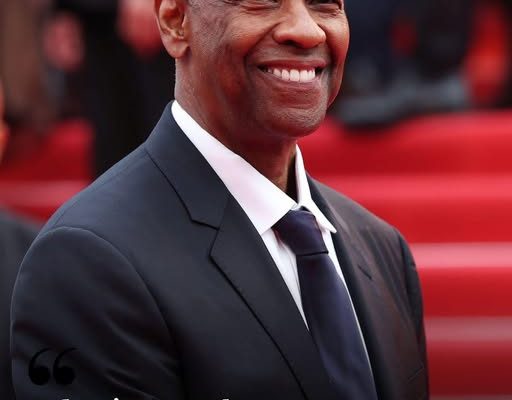Denzel Washington has long been regarded as one of the finest actors of his generation, a two-time Academy Award winner who has delivered some of the most memorable performances in Hollywood history. Yet in a surprising revelation during a recent interview with GQ, Washington admitted something that few might have expected from a man so deeply associated with the art form of film. “I don’t go to the movies, I don’t watch movies… I’m tired of movies,” he said, candidly opening up about his changing relationship with cinema. For fans and cinephiles, these words might sound almost shocking, given that Washington has spent decades shaping and defining the very medium he now says he no longer enjoys. His honesty, however, reflects not just his own personal evolution but perhaps something larger about the state of Hollywood and the experience of movies today.
When one thinks of Denzel Washington, one thinks of intensity, depth, and charisma that few actors can rival. From his powerful turn in “Glory,” which earned him his first Oscar, to his unforgettable role in “Training Day,” which brought him his second, Washington has cemented himself as a legend of the craft. His performances in films like “Malcolm X,” “Fences,” “Flight,” and “The Hurricane” are often studied in acting classes and discussed in film schools. For someone so deeply tied to the legacy of cinema, his disillusionment with it speaks volumes. It forces one to ask: what could possibly make a man who has given so much to the movies step away from them as a viewer? His comment does not suggest that he regrets his career but rather that, as he has grown, his appetite for consuming cinema has diminished.
Part of this sentiment may come from sheer longevity. Washington has been working in film for more than four decades. The pace of production, the endless interviews, the promotions, and the immersion in Hollywood culture may naturally lead to fatigue. For an artist, sometimes the magic fades when you see behind the curtain. What the audience perceives as a dazzling work of art is, for the actor, often a memory of grueling shoots, repeated takes, long hours, and the business negotiations that accompany every project. For Washington, movies might have ceased to feel like entertainment and instead become reminders of labor. In that context, his admission makes more sense.
Another factor may be the current state of the film industry. Washington grew to prominence during a time when mid-budget dramas and character-driven films dominated theaters. Audiences flocked to see complex, layered stories led by actors who could command the screen through performance alone. Today, however, Hollywood’s landscape looks quite different. Superhero blockbusters, massive franchises, and special effects-driven spectacles dominate box offices. While these films certainly have their place and their fans, it is no secret that many veteran actors and filmmakers lament the decline of original storytelling in mainstream cinema. Washington may simply no longer feel inspired by what is being produced on such a large scale.
It is also worth noting that Denzel Washington has long been known as a private man who values family and faith above fame. His focus has often been more on living a grounded life rather than immersing himself in celebrity culture. Perhaps, after a lifetime of making movies, he finds greater fulfillment in pursuits outside of film. Reading, spirituality, mentorship, and spending time with loved ones might simply outweigh the allure of sitting in a dark theater watching yet another story unfold on screen. Washington himself has often emphasized that he does not view himself as a star in the glamorous sense, but rather as a working actor. To him, cinema may now feel less like a source of joy and more like an old job that he has completed.
At the same time, Washington’s comment is not necessarily a condemnation of movies as an art form. Rather, it is a personal reflection. Every artist evolves, and sometimes stepping away from consuming one’s medium allows for a clearer head. There are many painters who rarely visit galleries, many musicians who do not listen to music in their daily lives, and many writers who read sparingly once they have found their voice. In this way, Washington may simply be expressing something common among artists who have reached a certain point in their journey. The passion that fueled their early years has transformed into something else, often a more detached relationship with the art they once consumed voraciously.
What remains undeniable is the influence Denzel Washington continues to have on cinema, even if he no longer consumes it himself. Young actors still look up to him as a model of discipline and excellence. Directors still cite his performances as examples of how much power can be conveyed through subtlety and presence. And audiences still celebrate his legacy every time his films are revisited on streaming platforms or taught in schools. His stepping back from watching movies does not diminish his contributions to the medium. In fact, it highlights the complexity of the relationship between artists and their art.
Interestingly, Washington’s words also invite reflection on how audiences themselves consume cinema today. Many people, not just actors, have expressed fatigue with movies. The abundance of content, the rise of streaming platforms, and the overwhelming number of releases each year can make even devoted film lovers feel burned out. Once upon a time, going to the movies was an event, something rare and special. Today, films are often dropped directly into our living rooms, competing with an endless stream of television shows, social media clips, and video games. Perhaps Washington is voicing something that many quietly feel: that the magic of movies has dimmed in the modern era, not because the art form itself has lost power, but because the cultural experience surrounding it has changed.
Despite this, his own career stands as proof of what cinema can achieve at its best. Washington has consistently chosen roles that challenge audiences to think, to empathize, and to confront uncomfortable truths. His portrayal of Malcolm X brought a complex historical figure vividly to life, inspiring new conversations about race, leadership, and justice. His role in “Training Day” gave viewers a chilling yet magnetic look at corruption and moral ambiguity. His work in “Fences” captured the pain and beauty of family life, while “Flight” forced audiences to grapple with addiction and redemption. These performances remind us why movies matter, even if one of their greatest practitioners now feels disconnected from them.
For many fans, Washington’s statement may serve as a moment to reflect on their own relationship with cinema. Do we watch movies with the same excitement we once did? Are we consuming them as meaningful art or just as content to pass the time? Washington’s fatigue could be a reminder to approach cinema with fresh eyes, to seek out the kinds of films that truly resonate rather than simply following the latest trend. If anything, his honesty might inspire audiences to reconnect with the transformative potential of movies, to revisit classics or to support bold new stories that might otherwise be overlooked.
It is also worth considering how Washington’s stance may influence younger actors and filmmakers. If someone of his stature admits to being tired of movies, it could challenge the industry to think more deeply about what it is producing and why. Hollywood has always been a balance between commerce and art, but voices like Washington’s suggest that the balance may need recalibration. Storytelling, after all, thrives when it pushes boundaries, takes risks, and speaks to the human condition. If even the masters grow weary of what is being offered, perhaps it is time for a creative renaissance.
Ultimately, Denzel Washington’s admission does not tarnish his legacy but enriches it. It shows that he is human, that even someone who has dedicated his life to film can feel weary of it. It reminds us that our passions can change, that we can love something deeply without needing to engage with it forever. For fans, his words might sting at first, but they can also be liberating. If Denzel Washington can walk away from watching movies after a lifetime in them, perhaps we too can be more selective with what we consume, choosing depth over quantity and meaning over habit.
As the interview circulates, audiences around the world are left with a mixture of surprise, respect, and curiosity. What will Washington do with his time now that cinema no longer occupies his attention? Will he continue to act occasionally, perhaps direct, or simply live quietly outside the spotlight? Whatever the case, his honesty has already sparked conversation, not only about his personal choices but also about the broader state of film culture today.
Denzel Washington’s words may not be what fans expected, but they carry weight precisely because they come from him. They challenge us to look at cinema differently, to question its role in our lives, and to consider how we might recapture its magic. Movies may no longer hold his attention, but they will always carry his mark. His contributions remain etched into the fabric of film history, even if he now views them from a distance.
What do you think about Denzel Washington’s perspective? Does it reflect how you feel about movies today, or do you still find joy and excitement in cinema the way you always have? Share your thoughts in the comments below—your perspective matters in this conversation about the evolving relationship between artists, audiences, and the movies we watch together.



